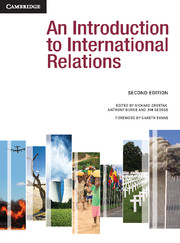Book contents
- Frontmatter
- Contents
- Tables, Figures and Boxes
- Contributors
- Preface and acknowledgements
- An Introduction to International Relations: The origins and changing agendas of a discipline
- 1 Theories of International Relations
- 2 The Traditional Agenda
- 9 The Modern State
- 10 Nations and Nationalism
- 11 Security
- 12 Arms Control
- 13 The Causes of War
- 14 The Changing Character of Warfare
- 15 The Ethics and Laws of War
- 16 International Law
- 17 International Society and European Expansion
- 18 Diplomacy
- 19 Great Powers
- 20 The Cold War
- 3 The New Agenda
- Glossary of Terms
- Bibliography
- Index
- References
17 - International Society and European Expansion
from 2 - The Traditional Agenda
- Frontmatter
- Contents
- Tables, Figures and Boxes
- Contributors
- Preface and acknowledgements
- An Introduction to International Relations: The origins and changing agendas of a discipline
- 1 Theories of International Relations
- 2 The Traditional Agenda
- 9 The Modern State
- 10 Nations and Nationalism
- 11 Security
- 12 Arms Control
- 13 The Causes of War
- 14 The Changing Character of Warfare
- 15 The Ethics and Laws of War
- 16 International Law
- 17 International Society and European Expansion
- 18 Diplomacy
- 19 Great Powers
- 20 The Cold War
- 3 The New Agenda
- Glossary of Terms
- Bibliography
- Index
- References
Summary
Introduction
This chapter examines the evolution of international society through European expansion. It considers, first, the nature of international society: does such a society exist? What are its features? What purpose does it serve? And does it have the requisite unity to act as an agent in international relations? The discussion here draws upon the work of the English School, which pioneered the notion of international society. Second, the differing approaches to international society taken by solidarism and pluralism will be navigated. Third, the history of international society through colonialism and decolonisation will be charted, revealing the neglected story of an ongoing capacity for ‘international society’ to colonise the space of non-liberal states. Such a capacity throws up a challenge to international society to act as a standard bearer for countries and indigenous peoples who continue to be subjugated to the interests of greater powers.
International society
‘International society’ is a central term and focus of the English School (see Box 17.1). It is used to refer to both an influential concept and an actual society of states that is fundamental to world politics. This distinction matters because it is very easy to slip between these two meanings when thinking about international society; the concept doesn’t easily correspond to how the world is actually constituted. Bearing this in mind, international society as an actual entity in world politics involves two stories; one of which is familiar and the other neglected. The familiar story presents international society as having its origins in newly formed sovereign European states, and recognising the need to regulate their mutual relations. Essential to this is an acceptance of plural conceptions of what is good and the entitlement of each sovereign state to conduct its internal affairs as it chooses. Cultural, religious and political differences are not seen to be a source of conflict, so long as there are rules of coexistence to guide states in their mutual relations. Largely as a consequence of the overseas expansion of Europe, and of colonisation and then decolonisation, the sovereign territorial state became the primary mode of political organisation, with practically all states becoming members of international society. From its inception international society constituted a moral community, meaning that members, at least in theory, treated each other as they would themselves be treated. Throughout the history of international society great powers have been central actors with both privileges and duties. Of these the most important duty has been to contribute to international order. At the core of this version of international society is a success story of the state as a form of political organisation and the historical maintenance of the society of states.
- Type
- Chapter
- Information
- An Introduction to International Relations , pp. 243 - 255Publisher: Cambridge University PressPrint publication year: 2011



